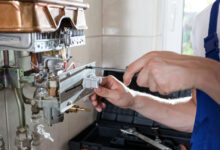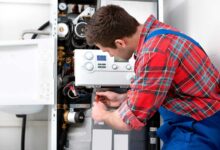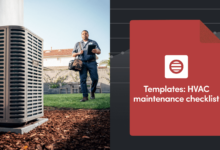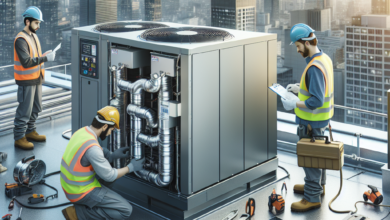Commercial HVAC Maintenance Contract
Commercial HVAC Maintenance Contract – When it comes to running a successful business, the comfort and efficiency of your commercial space play a crucial role. One essential aspect that ensures a comfortable environment is a well-maintained HVAC system. HVAC systems are responsible for heating, ventilation, and air conditioning, and regular maintenance is vital to keep them running smoothly and efficiently.
In this blog article, we will delve into the importance and benefits of having a commercial HVAC maintenance contract. Whether you are a business owner or a facility manager, understanding the significance of such a contract can help you optimize your HVAC system’s performance, save money in the long run, and provide a comfortable environment for your employees and customers.
What is a Commercial HVAC Maintenance Contract?
A commercial HVAC maintenance contract is a formal agreement between a business owner or facility manager and an HVAC service provider. It outlines the terms and conditions of regular maintenance and servicing of the commercial HVAC system. The contract typically includes scheduled inspections, filter replacements, cleaning, and any necessary repairs or adjustments.
The Role of Scheduled Inspections
Scheduled inspections are a vital component of a commercial HVAC maintenance contract. During these inspections, a qualified technician will thoroughly assess the various components of your HVAC system, including the heating unit, ventilation system, air conditioning unit, ductwork, and controls. The technician will look for signs of wear and tear, potential issues, and any areas that require attention.
The Importance of Filter Replacements
Filters are an integral part of any HVAC system as they help trap dust, allergens, and other particles, ensuring clean indoor air quality. Over time, filters become clogged and less effective, which can impact the system’s performance and the air quality within your commercial space. A commercial HVAC maintenance contract includes regular filter replacements to ensure optimal system efficiency and maintain a healthy indoor environment.
The Significance of Cleaning and Maintenance Tasks
Regular cleaning and maintenance tasks are crucial for maintaining the efficiency and longevity of your commercial HVAC system. These tasks may include cleaning the condenser coils, lubricating moving parts, inspecting electrical connections, testing thermostat accuracy, and cleaning or adjusting blower components. By performing these maintenance tasks, you can prevent potential issues, reduce energy consumption, and extend the lifespan of your HVAC equipment.
Addressing Repairs and Adjustments
A commercial HVAC maintenance contract also covers any necessary repairs and adjustments to your system. If the technician identifies any issues during inspections or routine maintenance, they will promptly address them to prevent further damage or system failures. By addressing repairs and adjustments in a timely manner, you can avoid costly breakdowns and ensure the uninterrupted operation of your HVAC system.
The Importance of Regular HVAC Maintenance
Regular HVAC maintenance is essential for several reasons. Firstly, it helps identify and address potential issues before they become major problems, preventing costly breakdowns and repairs. During inspections, technicians can detect early signs of component wear, refrigerant leaks, electrical issues, or airflow problems. By catching these issues early, you can avoid system failures and extend the lifespan of your HVAC equipment.
Secondly, proper maintenance ensures optimal energy efficiency, which can significantly reduce energy costs. Over time, dust, dirt, and debris can accumulate in your HVAC system, causing it to work harder to maintain the desired temperature. This extra strain leads to higher energy consumption and increased utility bills. Regular cleaning and maintenance tasks, as included in a commercial HVAC maintenance contract, help keep your system running at peak efficiency, resulting in lower energy costs.
Lastly, routine maintenance helps extend the lifespan of your HVAC system, allowing you to get the most out of your investment. HVAC equipment is a significant investment for any business, and it is crucial to maximize its lifespan. By regularly servicing and maintaining your system, you can reduce the risk of premature breakdowns and avoid the need for costly replacements. This not only saves you money but also provides peace of mind knowing that your HVAC system will reliably serve your business for years to come.
Benefits of Having a Commercial HVAC Maintenance Contract
A commercial HVAC maintenance contract offers numerous benefits for businesses:
Priority Service
With a contract in place, you are given priority service, ensuring that any issues with your HVAC system are addressed promptly. In the event of a breakdown or malfunction, you can expect a quick response from your HVAC service provider, minimizing downtime and reducing the impact on your business operations.
Cost Savings
Regular maintenance helps prevent major breakdowns, saving you from expensive repairs and potential downtime for your business. By addressing minor issues before they escalate, you can avoid costly emergency repairs or even the need for a complete system replacement. Additionally, a well-maintained HVAC system operates more efficiently, leading to reduced energy consumption and lower utility bills.
Improved Energy Efficiency
Properly maintained HVAC systems operate more efficiently, which can have a significant impact on your energy bills. During routine maintenance, technicians clean and inspect various components, ensuring that they are functioning optimally. Clean condenser coils, well-lubricated moving parts, and properly calibrated thermostats all contribute to improved energy efficiency, resulting in lower energy costs for your business.
Enhanced Indoor Air Quality
Regular filter replacements and cleaning help maintain clean and healthy indoor air quality, promoting a comfortable and productive environment for your employees and customers. Dust, allergens, and pollutants can accumulate in your HVAC system’s filters over time, reducing their effectiveness in capturing these particles. By regularly replacing the filters, you ensure that the air circulating in your commercial space is clean and free from harmful contaminants.
Prolonged Equipment Lifespan
Well-maintained HVAC systems tend to last longer, allowing you to maximize your investment and delay the need for costly replacements. During maintenance visits, technicians inspect and address any issues that could potentially shorten the lifespan of your equipment. By proactively maintaining your HVAC system, you can avoid premature breakdowns and ensure that your equipment operates efficiently for its intended lifespan.
Choosing the Right HVAC Service Provider
When selecting an HVAC service provider for your commercial maintenance contract, consider factors such as their experience, reputation, certifications, and range of services offered. Look for a provider that can tailor the contract to suit your specific needs and provide reliable and efficient service.
Experience and Expertise
Choose an HVAC service provider with extensive experience in commercial HVAC systems. Look for providers who have been in the industry for several years and have a proven track record of delivering high-quality service. An experienced provider will have the knowledge and expertise to handle the unique requirements of commercial HVAC systems and ensure their optimal performance.
Reputation and Customer Reviews
Research the reputation of HVAC service providers by reading customer reviews and testimonials. Look for providers with positive feedback from businesses similar to yours. A reputable provider will have a history of satisfied customers and demonstrate a commitment to delivering excellent service.
Certifications and Licensing
Check whether the HVAC service provider holds the necessary certifications and licenses. These certifications indicate that the provider has undergone training and meets industry standards. Look for certifications from organizations such as the Air Conditioning Contractors of America (ACCA) or North American Technician Excellence (NATE).
Range of Services Offered
Consider the range of services offered by the HVAC service provider. In addition to routine maintenance, look for providers that offer emergency repair services, system installations, energy efficiency assessments, and other specialized services. Choosing a provider that offers a comprehensive range of services ensures that all your HVAC needs can be met by a single trusted partner.
The Maintenance Process: What to Expect
Once you have a commercial HVAC maintenance contract in place, you can expect a series of steps to be followed during each maintenance visit. This section will outline the typical maintenance process, including inspections, cleaning, lubrication, filter replacements, and system performance evaluations.
Inspections and System Assessments
During each maintenance visit, a qualified technician will conduct a thorough inspection of your HVAC system. This inspection involves checking various components, such as the heating unit, ventilation system, air conditioning unit, ductwork, and controls. The technician will assess the condition of these components, identify any potential issues, and make recommendations for repairs or adjustments.
Cleaning and Removing Debris
Cleaning is an essential part of the maintenance process. The technician will clean various components of your HVAC system to remove dirt, dust, and debris that can accumulate over time. This may include cleaning the condenser coils, evaporator coils, blower components, and air filters. Removing dirt and debris helps improve system efficiency and prevents airflow restrictions that can lead to decreased performance.
Lubrication of Moving Parts
During maintenance visits, the technician will lubricate moving parts to ensure they operate smoothly. Moving parts such as motors, fans, and bearings require proper lubrication to reduce friction and prevent excessive wear. Lubrication helps extend the lifespan of these components, ensuring they continue to function optimally and reducing the risk of breakdowns.
Filter Replacements
Regular filter replacements are a crucial aspect of HVAC maintenance. Filters help trap dust, allergens, and other particles, ensuring clean and healthy indoor air quality. Over time, filters become clogged and less effective, impacting the systemperformance and the air quality within your commercial space. During each maintenance visit, the technician will replace the filters with new ones to ensure optimal system efficiency and maintain a healthy indoor environment. Depending on the type of filters used and the level of pollutants in your environment, filter replacements may be required monthly, quarterly, or annually.
System Performance Evaluations
As part of the maintenance process, the technician will evaluate the performance of your HVAC system. This evaluation may include testing the thermostat accuracy, measuring airflow, checking refrigerant levels, and assessing overall system functionality. By evaluating system performance, the technician can identify any inefficiencies or potential issues that may impact the system’s operation and make recommendations for improvements or repairs.
Additional Services and Upgrades
Beyond routine maintenance, many HVAC service providers offer additional services and upgrades that can further optimize your system’s performance. This section will explore some of these services, such as duct cleaning, energy efficiency assessments, and smart thermostat installations.
Duct Cleaning and Airflow Optimization
Over time, dust, dirt, and debris can accumulate in your HVAC system’s ductwork, leading to decreased airflow and reduced system efficiency. Duct cleaning involves the thorough cleaning of the ducts to remove these contaminants, improving airflow and ensuring that clean, conditioned air reaches every part of your commercial space. By optimizing airflow, you can enhance system performance, reduce energy consumption, and improve indoor air quality.
Energy Efficiency Assessments
An energy efficiency assessment involves a comprehensive evaluation of your HVAC system’s energy usage and efficiency. During this assessment, a technician will analyze factors such as insulation, ductwork condition, system sizing, and controls. Based on the findings, the technician will provide recommendations for energy-saving measures, such as sealing air leaks, adding insulation, or upgrading to more energy-efficient equipment. By implementing these recommendations, you can reduce energy waste and lower your utility bills.
Smart Thermostat Installations
Smart thermostats are programmable thermostats that offer advanced features and remote accessibility. These thermostats allow you to set customized temperature schedules, monitor energy usage, and control your HVAC system from anywhere using a smartphone app. By installing a smart thermostat, you can optimize temperature settings, maximize energy efficiency, and potentially save on heating and cooling costs.
Long-Term Cost Analysis: ROI of HVAC Maintenance
Investing in a commercial HVAC maintenance contract may require upfront costs, but it is crucial to consider the long-term return on investment. This section will discuss the potential cost savings and benefits that outweigh the initial expenses.
Reduced Energy Costs
One of the significant long-term benefits of regular HVAC maintenance is reduced energy costs. By maintaining your system’s efficiency through routine inspections, cleaning, and adjustments, you can lower your energy consumption and subsequently decrease your utility bills. The energy savings achieved over time can outweigh the initial investment in the maintenance contract, resulting in significant cost savings for your business.
Prevention of Costly Repairs
Regular maintenance helps identify and address minor issues before they escalate into major problems that require costly repairs. By detecting and resolving issues early on, you can prevent system failures, breakdowns, and the need for emergency repairs. The cost of routine maintenance is significantly lower than the expenses associated with repairing or replacing a malfunctioning HVAC system, making it a cost-effective investment in the long run.
Extended Equipment Lifespan
A well-maintained HVAC system tends to have a longer lifespan compared to one that is neglected. By investing in regular maintenance, you can extend the lifespan of your equipment and delay the need for a costly replacement. The longer your HVAC system lasts, the more value you get from your initial investment, leading to long-term cost savings for your business.
Improved Productivity and Customer Satisfaction
A comfortable and well-regulated indoor environment is essential for the productivity and satisfaction of your employees and customers. Regular HVAC maintenance ensures that your system operates optimally, providing consistent temperatures, proper ventilation, and clean air quality. By creating a comfortable and healthy environment, you can enhance employee productivity, reduce absenteeism, and improve customer satisfaction, ultimately benefiting your business’s bottom line.
Industry Regulations and Compliance
Commercial HVAC systems must adhere to various industry regulations and compliance standards. This section will provide an overview of these regulations and discuss how a maintenance contract can help ensure your system remains compliant.
Environmental Regulations
Environmental regulations aim to minimize the impact of HVAC systems on the environment. These regulations may include restrictions on refrigerant usage, energy efficiency requirements, and air quality standards. By maintaining your HVAC system in accordance with these regulations, you ensure that your business remains compliant and avoids potential penalties or legal issues.
Occupational Health and Safety Standards
Occupational health and safety standards focus on the well-being of employees and customers within a commercial space. HVAC systems play a significant role in maintaining a safe and comfortable indoor environment. By adhering to maintenance standards outlined in a commercial HVAC maintenance contract, you can ensure that your system operates safely, minimizing the risk of accidents, such as electrical malfunctions or indoor air quality issues.
Maintenance Recordkeeping
Many industry regulations require businesses to keep maintenance records for their HVAC systems. These records demonstrate that your system has been regularly serviced and maintained, providing evidence of compliance with industry standards. A commercial HVAC maintenance contract typically includes detailed documentation of all maintenance activities, making it easier for your business to demonstrate compliance during audits or inspections.
Case Studies: Real-Life Examples of Maintenance Benefits
Examining real-life case studies can help illustrate the significant impact regular HVAC maintenance can have on businesses. This section will present a few examples showcasing the benefits of commercial HVAC maintenance contracts in different industries.
Case Study: Retail Store Energy Savings
A retail store implemented a comprehensive commercial HVAC maintenance contract that included regular inspections, filter replacements, and energy efficiency assessments. By maintaining their HVAC system, the store achieved a substantial reduction in energy consumption, resulting in significant cost savings on their utility bills. The improved energy efficiency also created a more comfortable shopping environment for customers, leading to increased customer satisfaction and repeat business.
Case Study: Office Building Equipment Lifespan Extension
An office building invested in a commercial HVAC maintenance contract to ensure the optimal performance and longevity of their HVAC system. Through regular maintenance and timely repairs, they were able to extend the lifespan of their equipment by several years. This resulted in significant cost savings by avoiding the need for a premature system replacement. The extended equipment lifespan also provided a stable and comfortable working environment for employees, enhancing productivity and morale.
Case Study: Hospitality Industry Guest Comfort
A hotel implemented a commercial HVAC maintenance contract to ensure the comfort of their guests. By regularly servicing their HVAC system, they were able to prevent unexpected breakdowns, maintain consistent room temperatures, and provide high-quality indoor air. As a result, the hotel received positive guest reviews regarding the comfort and cleanliness of their rooms, leading to increased bookings and improved customer satisfaction ratings.
Tips for Optimizing HVAC System Performance
While a maintenance contract is essential, there are additional steps you can take to optimize your HVAC system’s performance. This section will provide practical tips and best practices to ensure your system operates at its best, such as regular air filter replacements, proper insulation, and adequate airflow management.
Regular Air Filter Replacements
Air filters play a critical role in maintaining clean indoor air quality and protecting your HVAC system from debris. Regularly replacing air filters is essential to ensure optimal system performance. Follow the manufacturer’s recommendations for filter replacement frequency and consider factors such as the level of pollutants in your environment. By keeping your filters clean and unclogged, you can enhance airflow and reduce strain on your HVAC equipment.
Proper Insulation and Air Sealing
Proper insulation and air sealing are crucial for maintaining a comfortable and energy-efficient indoor environment. Inadequate insulation or air leaks can result in heat transfer, causing your HVAC system to work harder to maintain desired temperatures. Ensure that your commercial space has sufficient insulation in walls, floors, and ceilings. Additionally, seal any air leaks around windows, doors, and ductwork to prevent energy waste and ensure optimal system performance.
Adequate Airflow Management
Proper airflow management is vital for maintaining a balanced and efficient HVAC system. Make sure that vents and registers are not blocked by furniture or other obstacles, as this can restrict airflow. Additionally, consider using fans strategically to promote air circulation and reduce the workload on your HVAC system. Proper airflow management helps ensure that conditioned air reaches all areas of your commercial space, providing consistent comfort and preventing excessive strain on your equipment.
In conclusion, a commercial HVAC maintenance contract is a valuable investment for businesses that want to ensure the optimal performance, energy efficiency, and longevity of their HVAC systems. By prioritizing regular maintenance, businesses can save costs, enhance indoor comfort, and provide a productive environment for their employees and customers. Partnering with a reputable HVAC service provider and tailoring the contract to your specific needs will help you reap the numerous benefits and peace of mind that come with a well-maintained HVAC system.









